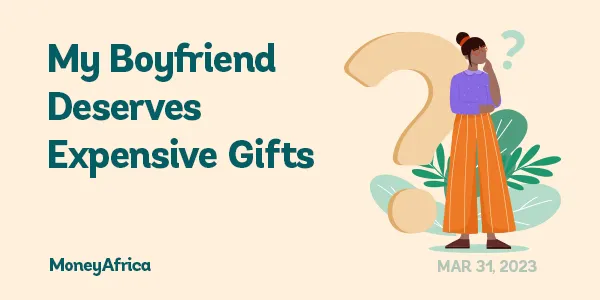Good Morning 😃
How are you doing?
Friday letters are usually dedicated to taking questions from our community. Do you have a question for us?
Please feel free to
- send an e-mail to info@themoneyafrica.com;
- or send a DM to any of our social media channels,
- or simply fill out this form.
Don’t worry, your responses are kept anonymous.
**
Question
I want to take my finances seriously but I can’t because I have a boyfriend. He spends a lot on me and it’s only right for me to do the same. I just graduated from school and I got a job about three months ago. I have been able to save a little money. His birthday and our two-year anniversary is coming up. How do I combine buying him gifts with also saving money for myself and my own needs? I feel pressured to buy him expensive gifts because he buys them for me.
Answer
It’s awesome that you’re thinking about your finances and how to balance your personal needs with your desire to buy gifts for your boyfriend.
We have crafted some suggestions to help you manage your finances while still celebrating your boyfriend’s special occasions:
Set a budget:
Before you start shopping, set a budget for how much you can afford to spend on gifts for your boyfriend. This will help you avoid overspending and ensure that you’re not putting your own financial goals at risk.
Prioritise your expenses:
Take a look at your current expenses and prioritise your spending. Determine which expenses are essential, such as rent, utilities and groceries, and allocate funds accordingly. Make sure you’re setting aside money for your own financial goals such as building an emergency fund, paying off debt or saving for the future.
Consider thoughtful but affordable gifts:
Expensive gifts aren’t always necessary to show your love and appreciation. Consider thoughtful, sentimental gifts that don’t break the bank. For example, you could create a scrapbook of your memories together or plan a special date night that doesn’t cost much.
Communicate with your boyfriend:
Talk to your boyfriend about your financial goals and concerns. Let him know that while you appreciate his generosity, you also want to make sure that you’re making responsible financial decisions. He may be understanding and willing to work with you on finding affordable gift options or even skipping gifts altogether in favour of spending quality time together.
Please note that taking control of your finances is an important step towards financial stability and independence. Don’t let external pressures or expectations dictate how you spend your money. Set clear goals for yourself and work towards them, and communicate openly with your loved ones about your financial priorities. To gain more knowledge on financial stability and independence, consider joining the MoneyAfrica community and subscribing to any of our plans.
***
Question
What’s your take on taking loans from banks to study abroad?
Answer
Taking a loan from a bank to study abroad is a huge financial decision that requires careful thought and consideration.
These are some factors to keep in mind when deciding whether to take out a loan to fund your education abroad:
Financial situation: Consider your personal financial situation before taking on debt. Taking on a significant amount of debt can be a long-term financial burden. Make sure you’re able to manage your debt and maintain your financial stability.
Alternative funding sources: Explore other options for funding your education abroad. Scholarships, grants, and work-study programmes may be available to help cover some of the costs. You may be able to save money by studying at a more affordable institution or in a less expensive location.
Interest rates:
Check the interest rates of the loan before you decide to apply for it. Interest rates on education loans can vary widely depending on the lender and your creditworthiness. Make sure you understand the terms of the loan and can afford the monthly payments.
Repayment terms:
Read the fine print and understand the repayment terms of the loan. Some loans may offer deferred payments or a grace period after graduation, but others may require payments to begin immediately. Understand how much you’ll need to pay each month, and whether you can realistically afford those payments.
Return on investment:
Consider the potential return on investment of your education. While studying abroad can be a valuable experience, make sure that the cost of the education is worth the investment. Explore your career prospects and potential earnings after graduation to determine whether the education will pay off in the long run.
In summary, please weigh the pros and cons carefully and explore all your options before taking out a loan to study abroad. Careful planning and research can help you make smart financial decisions and ensure that you’re able to pursue your education goals while maintaining your financial stability.
Did you find this newsletter useful? You can read previous newsletters here
Thank you for reading Money Africa’s Newsletter. Please feel free to share it.
Do you have any questions? You can send an e-mail to info@themoneyafrica.com or send a DM to any of our social media channels.
***
MoneyAfrica premium plan
Are you a mid to high-income earner? Do you find communities a bit too busy? You should sign up for our premium plan.
You can learn more about that here
Thank you for reading Money Africa’s Blog.
Please feel free to share it.
MoneyAfrica premium plan
Are you a mid to high-income earner? Do you find communities a bit too busy? You should sign up for our premium plan.

You can learn more about that here.
***
We often get questions regarding how to plan your finances to align with your relocation plans, especially for students seeking to further their studies. As always, we have heard you, and we have put together an e-book to help you navigate this. Follow this link, to get your FREE copy of the e-book: The Japa Encyclopedia.
***
Get our annual subscription and learn more about investing safely and building a solid portfolio in 2023.
Don’t forget to:
- Join our community, if you want to smash your 2023 financial goals. It takes at least 30 days to build great habits that will last you a lifetime. So why not start now? There is a lot you can achieve.
- If you would like to document your financial journey in 2023, then our journal would be an excellent fit for you. It costs ₦7,500 (excluding delivery).
- Get a budget sheet to track your monthly expenses. Click here
- Get an investment tracker to be on top of all your investments. Click here
MoneyAfrica is a financial literacy platform. Our goal is to make everyone better with their finances.
We do this by engagements via our:
– social media handles
– platforms for paid community members (for adults and students)
– webinar sessions with corporate clients
Would you like to join any of the communities? Please click here
Would you like us to hold a webinar for your company’s staff? Please send an email to info@themoneyafrica.com


